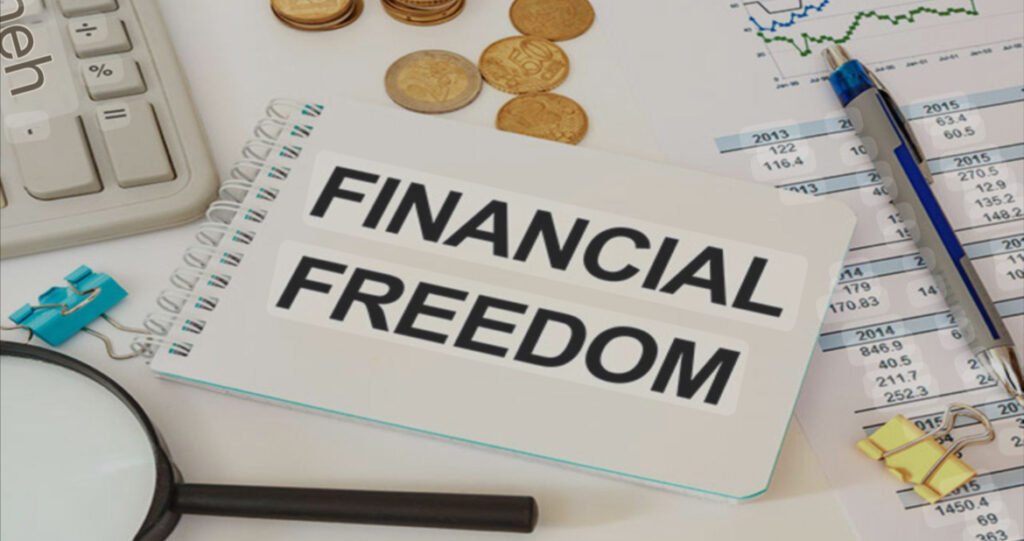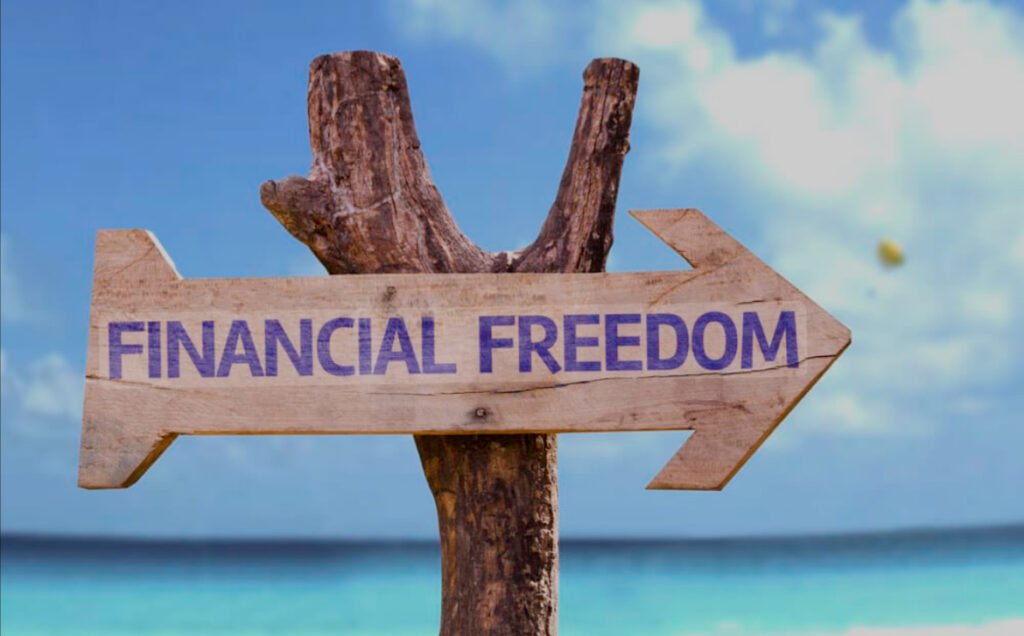Introduction: Why 2025 Is the Year to Reduce Your Expenses for Financial Freedom
If there’s one financial goal gaining massive momentum in 2025, it’s the desire to reduce your expenses for financial freedom. Across the globe, more people are realizing that the key to wealth isn’t just about making more money—it’s about keeping more of what you earn. With rising costs of living, economic uncertainty, and growing burnout from traditional 9-to-5 jobs, financial freedom is no longer a distant dream; it’s an urgent priority.
But here’s the truth: you don’t need to earn six figures or win the lottery to gain control over your life. What you need is a mindset shift—a commitment to reduce your expenses for financial freedom and intentionally design a lifestyle that serves your long-term goals. Every dollar you save is a dollar you can invest, stash for emergencies, or use to buy back your time. And that’s where real freedom begins.
Why is this especially relevant in 2025? Because we live in a time of both challenge and opportunity. Inflation has made everything from groceries to rent more expensive. Yet, on the flip side, we have access to more budgeting tools, online resources, and financial literacy education than ever before. That means anyone, regardless of income, can learn how to reduce their expenses for financial freedom—and actually succeed.
The goal isn’t to deprive yourself or live like a monk. It’s about aligning your spending with your values, cutting what doesn’t serve you, and keeping what brings lasting joy and meaning. When you reduce your expenses for financial freedom, you take control. You become less dependent on a paycheck, less stressed by unexpected bills, and more empowered to walk away from situations that don’t serve you—whether it’s a toxic job or a high-cost lifestyle.
This guide will show you how to do it. You’ll discover seven practical, proven, and powerful strategies that will help you reduce your expenses for financial freedom—without sacrificing the things that truly matter. From tracking spending and eliminating subscriptions to cooking at home and downsizing your life, each step builds toward a more intentional, financially secure future.
Let’s dive into the blueprint that can help you spend less, save more, and finally live life on your terms.
1. Track Every Dollar with a Purpose
The very first step to reduce your expenses for financial freedom is to know exactly where your money is going. Most people think they have a general idea—but when they take a closer look, they’re often shocked by how much disappears on small, unnecessary purchases. Coffee runs, impulse buys, random subscriptions—all these can quietly bleed your budget dry.
You can’t fix what you don’t track. That’s why awareness is the first superpower in financial freedom. Once you begin to monitor your spending habits, you’ll naturally begin to reduce your expenses for financial freedom because you’ll start noticing the hidden patterns. You might find you’re spending $300 a month on delivery apps or $100 on unused subscriptions. That’s money you could redirect toward saving, investing, or paying down debt.
There are countless tools to help you stay on top of your spending. Apps like YNAB (You Need a Budget), Empower, and Mint allow you to track your income, categorize your expenses, and set real-time savings goals. For those who prefer a more hands-on approach, spreadsheet budgeting works just as well.
What matters most is consistency. Make tracking a weekly habit. Review your bank statements and card transactions regularly. Assign every dollar a job—even if that job is “sit in savings.” The more intentional you become, the easier it is to reduce your expenses for financial freedom and redirect your money where it matters most.
Another bonus: tracking your finances also reduces financial anxiety. When you know how much you’re spending and why, money stops feeling mysterious or stressful. You’re in control, and that confidence is priceless.
Reducing your expenses begins with seeing your expenses—and that means tracking every dollar with clarity, purpose, and consistency.
2. Adopt a 30-Day Spending Rule
One of the most effective behavioral shifts you can make to reduce your expenses for financial freedom is to eliminate impulse purchases—and the 30-day rule is the perfect solution. This simple strategy builds patience, reduces emotional spending, and helps you make more intentional financial decisions.
Here’s how it works: Every time you want to buy something non-essential—like clothes, gadgets, or home décor—write it down on a “want list” and wait 30 days. If you still want it after that time (and can afford it without derailing your financial goals), then go ahead and buy it. But in most cases, that desire will fade—and so will the urge to spend.
The beauty of this strategy is how it rewires your relationship with money. By putting a pause between desire and decision, you take back control of your spending habits. This helps you naturally reduce your expenses for financial freedom because you’re no longer reacting to marketing, stress, or boredom. You’re making purchases from a place of purpose.
The 30-day rule is especially powerful in 2025, when online shopping makes it easy to buy with just one click. Temptations are everywhere—social media ads, flash sales, influencer promotions. But when you commit to waiting, you realize just how much of your spending was habitual or unnecessary.
To make this work, create a simple system. Use a spreadsheet, a notes app, or a whiteboard on your fridge. Whenever the urge to buy strikes, jot down the item, the date, and why you want it. You’ll be surprised how often your future self thanks you for walking away.
Over time, this practice builds mindfulness and aligns your spending with your values. It helps you cut the clutter, save money, and reduce your expenses for financial freedom—all without feeling deprived.
Intentional spending leads to intentional living. And that’s exactly what financial freedom is about.
3. Slash Recurring Monthly Expenses
Recurring monthly expenses can quietly sabotage your finances without you even noticing. These automatic charges—like subscription services, unused gym memberships, app fees, and inflated utility bills—can add up fast. To reduce your expenses for financial freedom, it’s critical to audit and cut these regular costs.
Start by reviewing your bank and credit card statements for the last two to three months. Highlight any charges that occur every month or quarter. Ask yourself: Do I still use this? Do I need this? Can I get a better deal elsewhere? If the answer is no, cancel it immediately.
The average household pays for more than 10 subscription services, many of which go unused. Streaming platforms, software you no longer use, cloud storage plans, and digital news subscriptions often auto-renew without your full attention. Canceling or downgrading just a few of these can instantly reduce your expenses for financial freedom.
Next, negotiate better rates on necessary services. Call your internet, phone, or insurance providers and ask about current promotions or loyalty discounts. Many companies will lower your bill just to keep you as a customer—especially if you mention you’re considering canceling or switching to a competitor.
If you’re renting, consider negotiating your lease renewal or shopping around for a more affordable place. Utility bills can also be reduced by adjusting thermostat settings, switching to energy-efficient lighting, and being mindful of water and electricity usage.
Also, bundle services where possible. Many companies offer discounts when you combine internet, mobile, and streaming. The key is to optimize what you truly need—and eliminate what you don’t.
Reducing recurring expenses doesn’t just save money—it builds momentum. Every dollar you redirect toward your goals compounds over time. And as you continue to reduce your expenses for financial freedom, you’ll find that these small wins add up to serious savings.
4. Cook More, Eat Out Less
If you’re serious about trying to reduce your expenses for financial freedom, your food budget is one of the best places to start. Dining out, even casually, adds up quickly. Whether it’s grabbing a $12 lunch every day or ordering $40 worth of delivery a few times a week, eating out is often one of the biggest silent money drains in modern budgets.
On the flip side, cooking at home is not only more affordable—it’s often healthier, more satisfying, and a great skill to build. A home-cooked meal usually costs a fraction of what you’d spend at a restaurant, even when factoring in ingredients, utilities, and time.
The goal isn’t to give up restaurants entirely. It’s about being intentional. Reserve eating out for special occasions or specific social events—and not as your default plan every weeknight. When you cook more and eat out less, you naturally reduce your expenses for financial freedom without sacrificing quality of life.
To get started, try meal planning. Choose 4–5 meals for the week, shop with a list, and stick to it. Cooking in batches or prepping lunches ahead of time can save you both money and stress during the workweek. Invest in a few go-to spices and pantry staples that make simple meals taste gourmet. Even if you’re not a culinary expert, you’ll quickly discover easy recipes that taste better and cost far less than takeout.
Also, consider making “restaurant-style” meals at home. You can recreate your favorite pasta dish, Thai curry, or burger night at home for a fraction of the price. This gives you the satisfaction of the restaurant experience while keeping your finances in check.
Every meal you cook yourself is money kept in your wallet and progress made toward your goal to reduce your expenses for financial freedom. It’s a daily habit that adds up to big results over time.
5. Downsize and Declutter Your Lifestyle
When it comes to lasting financial freedom, simplicity is your ally. One of the most transformative ways to reduce your expenses for financial freedom is by downsizing your lifestyle—not just your living space, but your commitments, belongings, and financial obligations.
Many people are trapped in a cycle of maintaining a lifestyle they can barely afford. Big homes with big mortgages, two car payments, constant upgrades to electronics, fashion, and home décor—these all come at a cost. And while they may offer short-term satisfaction, they often delay long-term financial goals.
Downsizing doesn’t mean depriving yourself—it means redefining what enough looks like. Do you really need a three-bedroom apartment if you live alone? Could you trade your car for a bike or public transport? Could you sell some of your unused items and use the cash to pay off debt or boost your savings?
Start by decluttering your physical space. Go through your closets, garage, kitchen, and storage. Sell what you don’t use on platforms like Facebook Marketplace, OfferUp, or Poshmark. Not only will this put extra cash in your pocket, but it will also help you detach from material clutter that often encourages more spending.
Consider applying minimalist principles to your financial life. Cancel unused services, cut back on the number of credit cards, or eliminate extra bank accounts. A streamlined financial setup is easier to manage and harder to overspend.
Many who follow the FIRE (Financial Independence, Retire Early) movement reduce their expenses for financial freedom by adopting smaller homes, fewer possessions, and simpler routines. The result? More time, less stress, and greater freedom to choose how they spend their days.
Downsizing is a powerful mindset shift. It’s about living intentionally—not just within your means, but below them—so that you can focus on what truly matters. And when you strip away the excess, you’ll find your path to freedom becomes much clearer.
6. Embrace DIY Solutions
Every time you pay someone else for a task you can learn to do yourself, you’re giving away money that could be working toward your goals. One of the most empowering and cost-effective ways to reduce your expenses for financial freedom is to embrace the DIY (Do-It-Yourself) mindset. Not only can this save you hundreds or even thousands per year, but it also builds valuable skills and confidence.
Start by looking at everyday expenses you typically outsource. Could you change your own oil? Trim your own hair? Fix a leaky faucet or repaint a wall? These might sound minor, but the savings add up quickly when you stop outsourcing every little thing. In 2025, there’s a YouTube tutorial for almost anything, and learning basic skills has never been more accessible.
Beyond home and auto maintenance, you can also apply the DIY approach to gifts, decorations, organizing tools, or even small furniture upgrades. Instead of buying expensive holiday presents, consider making something thoughtful and personalized. Instead of hiring someone to install shelves or tech gadgets, watch a few tutorials and give it a try.
For families and couples, turning DIY tasks into bonding activities can also improve relationships while slashing costs. Whether it’s gardening together, cooking from scratch, or repainting a room, you’re not just saving money—you’re creating memories and fostering independence.
Many people discover hobbies through DIY projects, which can eventually turn into side hustles or small income streams. By reducing what you pay for and increasing what you can create, you automatically reduce your expenses for financial freedom while potentially opening up new opportunities.
The DIY lifestyle is about more than just saving a buck—it’s about reclaiming self-reliance and learning how to meet your own needs. When you stop outsourcing what you could do yourself, you gain both financial and personal freedom.
7. Delay Gratification and Set Spending Boundaries
One of the most essential habits you can build to reduce your expenses for financial freedom is learning to delay gratification. In a world of instant everything—one-click shopping, same-day delivery, and social media-driven consumption—slowing down your spending takes intention, but it pays off in powerful ways.
Delaying gratification isn’t about deprivation. It’s about making thoughtful, values-driven financial decisions rather than reacting emotionally or impulsively. When you get in the habit of pausing before purchases, you give yourself time to evaluate whether something truly adds value to your life or is just a temporary desire.
A practical way to implement this is to set clear spending boundaries for different categories in your life. Use budgeting tools or cash envelope systems to cap what you can spend each month on things like entertainment, clothing, eating out, or hobbies. When the money runs out, that category is closed for the month—no exceptions.
This structure gives you the freedom to spend within limits while making sure your financial goals stay on track. More importantly, it makes you conscious of your choices. Instead of wondering where your money went, you’ll know exactly where it’s going—and why.
When you reduce your expenses for financial freedom through delayed gratification and boundary-setting, you develop discipline that spills over into every other area of life. You’ll be less tempted by sales, less influenced by trends, and more connected to what truly brings you joy and purpose.
Delaying gratification also helps strengthen your long-term vision. By saying “not now” to unnecessary spending, you’re saying “yes” to future goals—whether that’s early retirement, starting a business, or buying a home debt-free.
In the end, it’s not about how much money you make—it’s about how wisely you use what you already have. And when you align your spending with your goals and values, you not only reduce your expenses for financial freedom—you create a life that feels rich in every way.
Final Thoughts: The Power of Reducing Your Expenses for Financial Freedom
If there’s one financial truth that holds strong in 2025, it’s this: you don’t need to earn more to live better—you need to spend better. When you choose to reduce your expenses for financial freedom, you’re not just saving money. You’re buying back your time, peace of mind, and long-term security.
Throughout this guide, you’ve learned seven powerful strategies to help you achieve just that. From tracking your spending and canceling unnecessary subscriptions to cooking more meals at home, downsizing your lifestyle, and setting firm financial boundaries—each of these habits brings you one step closer to true financial independence.
But here’s what’s most important to remember: reducing your expenses isn’t about restriction. It’s about intention. It’s about identifying what genuinely matters to you and cutting away everything that doesn’t. When you live on less than you earn—not because you have to, but because you want to—you put yourself in control. You build financial flexibility and open the door to options that most people don’t have.
Want to take a sabbatical? Start a business? Travel for six months? Retire early? All of these become realistic goals when you reduce your expenses for financial freedom and begin living on purpose.
You also build resilience. A leaner lifestyle shields you from economic volatility, job loss, or unexpected emergencies. You’ll sleep better knowing that you don’t need a massive income or luxurious lifestyle to be secure. You simply need a smart, steady plan—and the discipline to stick with it.
This journey is about more than dollars and cents. It’s about reclaiming your life. Every time you say no to mindless spending, you’re saying yes to your future. Every time you choose to cook at home, DIY a project, or cancel a recurring charge, you’re making a powerful investment—not just in your bank account, but in your freedom.
So what’s next?
Start small. Choose one expense to eliminate this week. Begin tracking your spending. Reevaluate your subscriptions. These micro-decisions build momentum—and before you know it, your savings will grow, your stress will shrink, and your goals will come within reach.
And as you continue to reduce your expenses for financial freedom, remember: this is a lifestyle, not a quick fix. Your habits today shape your freedom tomorrow. And the freedom to choose how you live, work, and spend your time is the greatest wealth of all.








